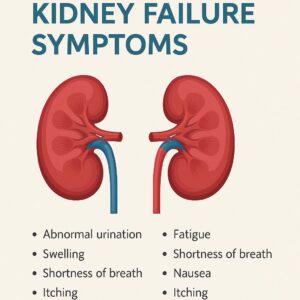Navigating Stage 4 Kidney Failure: Key Symptoms and What to Expect
Receiving a diagnosis of Stage 4 chronic kidney disease (CKD) can be overwhelming. This advanced stage means your kidneys are severely damaged and are not filtering waste from your blood as they should. Understanding the stage 4 kidney failure symptoms is a critical step in managing your health and working with your healthcare team to plan for the future.
This article will walk you through the common symptoms, explain why they happen, and provide guidance on managing this serious condition.

What is Stage 4 Kidney Failure?
Before diving into the symptoms, it’s important to understand what Stage 4 means. Doctors measure kidney function using an estimated Glomerular Filtration Rate (eGFR), which indicates how well your kidneys are filtering.
-
Stage 4 Kidney Disease: Characterized by an eGFR between 15 and 29. This indicates a severe decrease in kidney function and is the last stage before kidney failure (Stage 5, or end-stage renal disease).
At this stage, waste products and excess fluid can build up in your body, leading to a condition called uremia. Many of the symptoms of Stage 4 CKD are a direct result of this buildup.
Common Stage 4 Kidney Failure Symptoms
While some individuals may experience few symptoms, most people in Stage 4 will notice significant changes in their health. Here are the most common signs to watch for.

1. Persistent Fatigue and Weakness
This is one of the most reported symptoms. It’s not just feeling tired; it’s a deep, bone-wearying exhaustion that doesn’t improve with rest.
-
Why it happens: Healthy kidneys produce a hormone called erythropoietin (EPO), which tells your body to make red blood cells. In Stage 4, your kidneys produce less EPO, leading to anemia (a shortage of red blood cells). Fewer red blood cells mean less oxygen is delivered to your muscles and brain, causing severe fatigue.
2. Swelling (Edema)
You may notice swelling in your hands, feet, ankles, or face. This is known as edema.
-
Why it happens: Damaged kidneys can no longer effectively remove excess fluid and sodium from the body. This fluid accumulates in your tissues, causing puffiness and swelling.
3. Changes in Urination
Pay close attention to your bathroom habits, as they can reveal a lot about your kidney function.
-
Urinating more or less often than usual.
-
Urine that is foamy or bubbly (a sign of protein in the urine).
-
Urine that is dark orange, brown, or red (a sign of blood).
-
Feeling pressure or difficulty when urinating.
4. Nausea, Vomiting, and Loss of Appetite
Feeling sick to your stomach and losing interest in food are common complaints. Many people also report a metallic taste in their mouth.
-
Why it happens: The buildup of waste products (uremia) in your bloodstream can irritate the stomach lining and affect your sense of taste and smell, leading to nausea and a poor appetite. The metallic taste is often referred to as “ammonia breath.”
5. Shortness of Breath
Feeling winded after minimal effort, or even while resting, is a serious symptom.
-
Why it happens: This can be caused by two main factors:
-
Fluid in the lungs (pulmonary edema): Excess fluid that the kidneys can’t remove can build up in the lungs.
-
Anemia: A lack of oxygen-carrying red blood cells makes it difficult for your body to get the oxygen it needs.
-
6. Itchy Skin (Pruritus)
Intense, persistent itching is a frustrating and uncomfortable symptom for many.
-
Why it happens: When the kidneys fail, they can’t balance the minerals in your blood. A buildup of phosphorus is a primary cause of severe itching in patients with kidney disease.
7. Muscle Cramps and Twitching
Painful muscle cramps, especially in the legs, and involuntary muscle twitching can occur.
-
Why it happens: This is often due to an imbalance of electrolytes like calcium, phosphorus, and potassium, which are normally regulated by the kidneys.
8. “Brain Fog” and Difficulty Concentrating
Feeling confused, having trouble focusing, or experiencing memory problems are signs that toxins are affecting your brain.
-
Why it happens: Uremia (the buildup of toxins in the blood) can impact cognitive function, leading to what many describe as “brain fog.”
When to See a Doctor
If you have been diagnosed with an earlier stage of CKD and begin experiencing these symptoms, you must contact your nephrologist immediately. Do not ignore these signs. They indicate that your kidney function is worsening and your treatment plan may need to be adjusted.
If you have not been diagnosed with kidney disease but are experiencing a combination of these symptoms, schedule an appointment with your doctor for a full evaluation, including blood and urine tests.
Managing Stage 4 Kidney Disease
While Stage 4 is a serious condition, it is manageable. The primary goals are to slow the progression of the disease, manage symptoms, and prepare for the potential need for dialysis or a kidney transplant.

-
Working with a Healthcare Team: You will be under the care of a nephrologist (kidney specialist) and may also work with a renal dietitian, who can help you with a specialized diet.
-
Dietary Changes: You will need to strictly limit your intake of sodium, potassium, and phosphorus. A lower-protein diet may also be recommended to reduce the workload on your kidneys. For more information, read our guide on a kidney-friendly diet.
-
Medications: Your doctor may prescribe medications to manage blood pressure (ACE inhibitors, ARBs), treat anemia (EPO injections), lower phosphorus levels (phosphate binders), and manage other complications.
-
Planning for the Future: Your doctor will begin discussing treatment options for Stage 5, which include dialysis (hemodialysis or peritoneal dialysis) or a kidney transplant.
A Final Word
Living with Stage 4 kidney failure presents daily challenges, but knowledge is power. By understanding the stage 4 kidney failure symptoms and working closely with your medical team, you can take control of your health, improve your quality of life, and make informed decisions about your treatment path.
Disclaimer: This article is for informational purposes only and does not constitute medical advice. The information contained herein is not a substitute for and should never be relied upon for professional medical advice. Always talk to your doctor about the risks and benefits of any treatment.